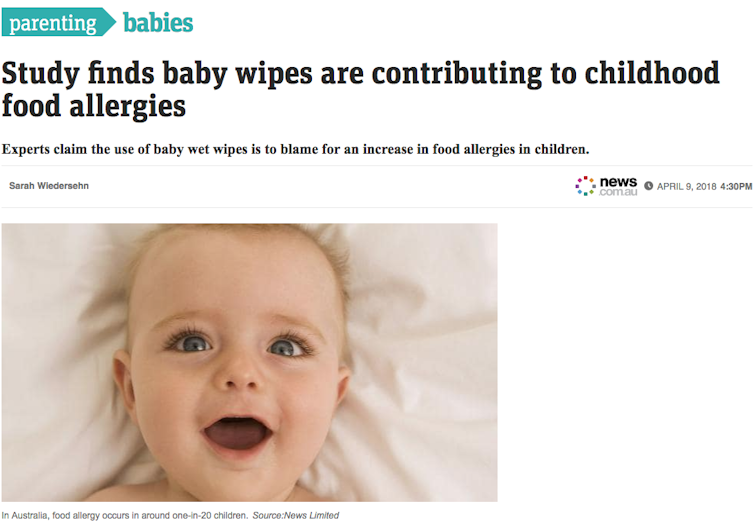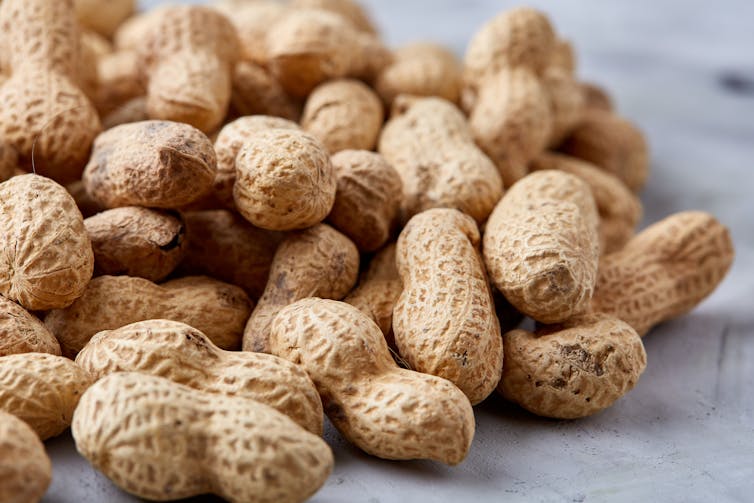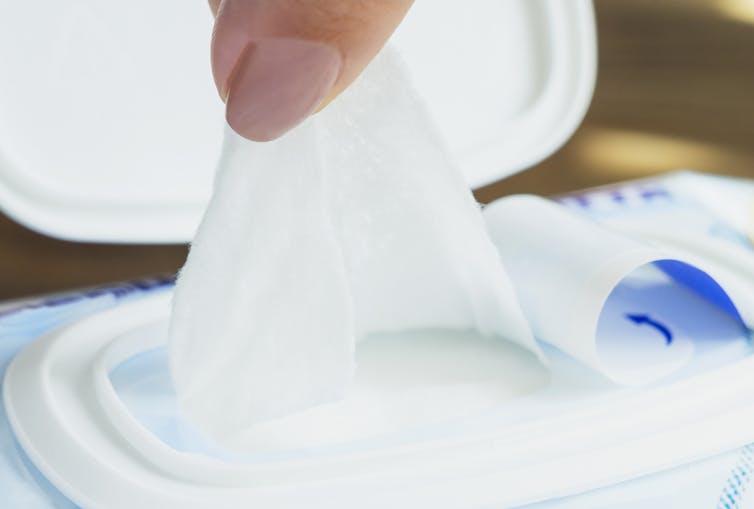can baby wipes cause childhood food allergies?
- Written by Jennifer Koplin, Research Fellow, Population Health, Murdoch Childrens Research Institute
Parents may have been understandably worried reading recent headlines announcing:
Baby wipes linked to food allergies
Study finds baby wipes are contributing to childhood food allergies
In Australia, up to one in ten babies and one in 20 older children have a food allergy. In children with a food allergy, allergic reactions can be severe, and lead to hospitalisation and even, occasionally, death.
But when it comes to baby wipes, parents can rest easy. Because, contrary to the headlines, the study being reported on did not provide evidence that using baby wipes increases a child’s risk of developing a food allergy.
In fact, baby wipes weren’t analysed, nor did they feature, in the study at all. Plus, the study was in mice, not humans.
 Media representation of the study.
news.com/screenshot
Media representation of the study.
news.com/screenshot
How was the study conducted?
The study was published in the Journal of Allergy and Clinical Immunology. Its main aim was to look at how damage to the skin barrier, as occurs with eczema, contributes to the development of food allergy.
We know from other studies that skin barrier damage might be an important factor in children’s food allergies. Infants with eczema are more likely to develop food allergies. We also know that children with some genetic mutations that affect the skin have more food allergies.
Researchers used mice to model a type of food allergy in humans, known as IgE-mediated food allergy. People with this allergy develop “sensitisation” to certain foods, such as peanuts. Some of these sensitised people then develop an allergic reaction when they eat the food.
At this stage, it is thought that sensitisation could occur in humans through skin exposure, but studies haven’t yet proven the link.
Read more: What are allergies and why are we getting more of them?
The researchers used newborn mice with genetic defects in skin barrier function genes and took several steps to cause the mice to develop reactions to peanut.
They first applied sodium dodecyl sulfate, a chemical often found in soap, on the mouse’s skin, to stop the next solution from rolling off the skin.
Then they applied drops containing peanut and environmental allergens found in house dust to their skin at regular intervals to cause “sensitisation”. They then gave the peanut orally.
The researchers tested mice for reactions that may indicate food allergy, such as a drop in body temperature after oral peanut exposure.
Environmental allergens from house dust were used because researchers have previously shown that house dust may contain peanut proteins. They also showed that children growing up in environments with more peanut in the dust more often develop peanut allergy, but only if they also have genetic mutations affecting the skin barrier.
 The researchers were testing the mice for allergic reactions to peanuts.
www.shutterstock.com
The researchers were testing the mice for allergic reactions to peanuts.
www.shutterstock.com
What were the results?
The researchers showed they could cause peanut allergy in newborn mice with genetic defects in skin barrier function by exposing the mice to peanut along with house dust allergens through the skin.
Without the house dust allergens, none of the other triggers (sodium dodecyl sulfate, peanut, skin barrier mutations) had any effect.
Read more: Introduce eggs and peanuts early in infants' diets to reduce the risk of allergies
This suggests that sensitisation to peanut can occur through the skin in this mouse model, but only in the presence of environmental allergens. The newborn mice required both genetic defects in skin barrier function and skin exposure to peanut and components of house dust to develop the allergy.
However, it is not clear from this study alone that these same factors are also necessary for food allergy in children.
What about baby wipes?
So, where did the idea that baby wipes might be linked to food allergy come from?
The researchers state that the sodium dodecyl sulfate they used to hold the solution in place is found in cleansing wipes. They write:
… soap components, such as sodium lauryl sulfate, which is sodium dodecyl sulfate (SDS), in cleansing wipes… might facilitate allergen uptake during feeding and cleaning of infants with skin barrier mutations.
We took a quick look at some common brands of baby wipes, however, and did not find sodium dodecyl sulfate in the list of ingredients.
It is also difficult to know how this relates to the development of food sensitisation in babies who are exposed to baby wipes, even if the wipes did contain the chemical. This would require comparing the outcomes of mice who were exposed to sodium dodecyl sulfate, to those who weren’t. And this was not done in the study.
 The relationship between baby wipes and food allergy was not proven in the study.
www.shutterstock.com
The relationship between baby wipes and food allergy was not proven in the study.
www.shutterstock.com
What else should we consider?
It is plausible that having a damaged skin barrier in infancy might increase the risk of peanut components being absorbed through the skin, and that this could lead to an allergy.
While these are interesting observations, convincing evidence that something causes or prevents food allergy can usually only be obtained in a randomised controlled trial. This is when one group that is given a certain intervention (like being exposed to an allergen) is compared to a “control” group, that either is given another intervention or nothing at all.
The only such trial for preventing peanut allergy so far showed that earlier introduction of peanut to infants with severe eczema reduced their risk of developing a peanut allergy.
Read more: Can I prevent food allergies in my kids?
Randomised trials are currently underway looking at whether using creams to improve the skin barrier can prevent infants from becoming allergic to food. This will provide more information about the role of the skin barrier in the development of food allergy in children.
While it is possible that excessive use of soaps or soap-containing products could damage the skin barrier and increase the chances of absorbing food allergens through the skin, further studies are needed to confirm this.
Although using soaps for newborn infants is not recommended because it will dry their skin, there is no convincing evidence that avoiding soap will reduce a child’s risk of developing a food allergy. And there is even less evidence for avoiding baby wipes. - Jennifer Koplin and Melanie Neeland
Peer Review
I have reviewed the Research Check and the paper it is based on, as well as some of the supporting literature. I have also and independently checked baby-wipe ingredient lists.
The Research Check is a fair and balanced assessment of the original research. – Ian Musgrave
Authors: Jennifer Koplin, Research Fellow, Population Health, Murdoch Childrens Research Institute
Read more http://theconversation.com/research-check-can-baby-wipes-cause-childhood-food-allergies-94981




